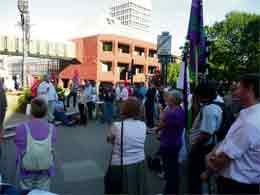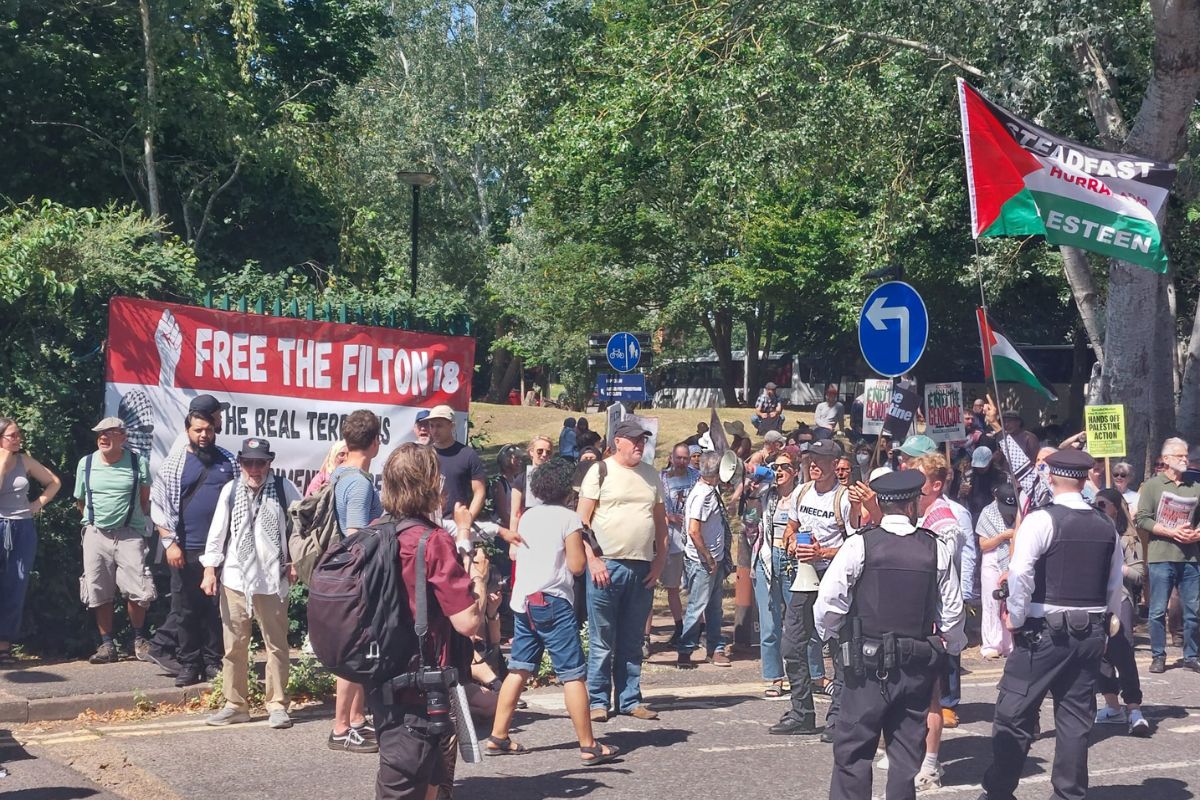Over the past few days the labour and trade union movement
in Coventry has begun to move into action to mobilise working people against
the cuts announced by the Lib-Con government. The mass Unite rally last Saturday,
June 19th, already reported on the Socialist Appeal website, was the
first step.
On Monday, June 21st, there was a lunchtime rally
by trade unionists, mainly UCU and Unison, outside City College Coventry. We
were taking part in the national day of action under the banner United for
Education. The day was jointly convened by all trade unions in education – UCU,
GMB, NUS, Unite, Unison, EIS and ATL. In many parts of the country there were
strikes, demonstrations and meetings such as that in Coventry.
At this moment in time there are no compulsory redundancies
at City College Coventry. Those who are leaving work are doing so under a
voluntary agreement. The UCU branch however has passed a motion that is there
are compulsory redundancies, then industrial action will take place. At the
rally, attended by around 70 trade unionists, the speakers highlighted the
lunacy of cutting spending in education at a time when there was such a great
need for education.
The writer of this report pointed out that a million young
people under 25 have been labelled NEETS – not in education, employment or
training. They have simply disappeared from registers. Around 7 million adults
in the UK are illiterate and 14 million are innumerate, yet 70% of FE colleges
around the country are shutting courses and sacking staff. We have the skilled
workers in the sector, we have the buildings and we have the resources, and
there is a need for what we offer, yet at the dictates of the money markets
public spending was being cut across the board.
This is not an act of vindictiveness. The government has
gone to the financial markets to borrow money by selling government bonds. The
money men have agreed to buy the bonds, and therefore effectively lend the
government money, on the condition that public finances are in a sound state.
By cutting the public sector deficit the money markets are saying that a
situation of possible sovereign default will be avoided and the markets will
have a greater chance of getting their loans back.
The lunacy of the situation is that since the financial
crisis began some £870bn of public money has been used in one form or another
to bail out the financial system to avoid the collapse of capitalism. The state
has stepped in to save capitalism. Now the government wants to borrow some of
the money that it lent the banks and the banks are dictating the conditions of
the loan. The banks cause the crisis and working people pay the price in public
spending cuts.
WHY NOT TAKE THE BANKS INTO PUBLIC OWNERSHIP AND USE THE PUBLIC
MONEY GIVEN TO THEM TO BEGIN TO PLAN TH DEVELOPMENT OF THE ECONOMY TO MEET NEED
AND NOT PROFIT AND BONUSES?
On Tuesday June 22nd there was another public
rally of trade unionists and community groups on the steps of the Coventry
Council House. The rally had been convened by Coventry Trades Union Council and
attracted about a 100 people. The message from the rally from a succession of
speakers was that WE DID NOT CAUSE THE CRISIS SO WE WILL NOT PAY FOR IT.
There was a determined mood in the air that the trade unions
need to mobilise their members to defend services, jobs, wages and conditions.
There has to be a mighty response on the industrial plain to defend the
providers of public services and the users of public services, in other words
to unite unions in the so-called public and private sectors of the economy,
together with community groups, to defend the gains of the of the past, the
reforms that we have fought so hard to achieve.
However, the writer of this report asked the basic question
of whether the battle can be won purely by fighting on the industrial front. A
political response was also necessary and it was no accident that inside the
Council House the Labour Party had regained control by winning six seats at the
last election. The Socialist Party candidate and sitting Councillor Rob
Windsor, despite increasing his vote, had lost his seat to the Labour Party as
traditional Labour voters had turned out to defend their party and council from
the Tories. This writer therefore issued an appeal to all trade unionists to
join the Labour Party and join the fight for socialist policies inside the
Labour Party.
Following the public rally, about seventy of those who came
adjourned to a local pub for a meeting convened by CTUC. The trade unions
represented were Unite, Unison, PCS, UCU, NUT, TSSA and CWU. After a thorough
discussion of the issues involved and under the auspices of resolutions already
passed by the CTUC and the National Conference of Trades Councils recently held
in Blackpool, which has already been reported by Socialist Appeal, the meeting
agreed to “establish a Coventry city-wide anti-cuts campaigning group. The aim
of this group will be to bring together all people, as workers or users of
public services suffering from the cuts in the public, private and voluntary
sectors; to offer practical solidarity; and to promote and campaign on a
programme to fight the cuts being imposed at national, regional and local
level.”
The meeting felt that such a group should be made up of
representatives from the various trade unions and community groups that were in
attendance. The group would function in a way that was similar to the Miners
Support Group in the 1980s. Members present would also campaign in their own
trade unions to demand national action by trade union leaders to defend working
class people.
Another meeting of the group is planned for a week’s time
and in the meanwhile a petition is being organised, a leaflet is being produced
that will explain in simple terms why the economic crisis exists and will call
on people to join together to resist the cuts. Plans are also underway for a
public meeting with national speakers.
Coventry working people are on the move and the CTUC is
playing the lead role in organising the fight back against the cuts. The same
should be repeated up and down the country so that we build local, regional and
national movements and have as a target the convening of a mass national
demonstration, convened by the TUC, in London and other UK capital cities in
September or October. Such a demonstration would show the depth of feeling in
the working class and their organisations against these cuts and the strength
of the movement in opposing them and fighting for a policy that will put an end
to cuts forever by fighting for socialism.






